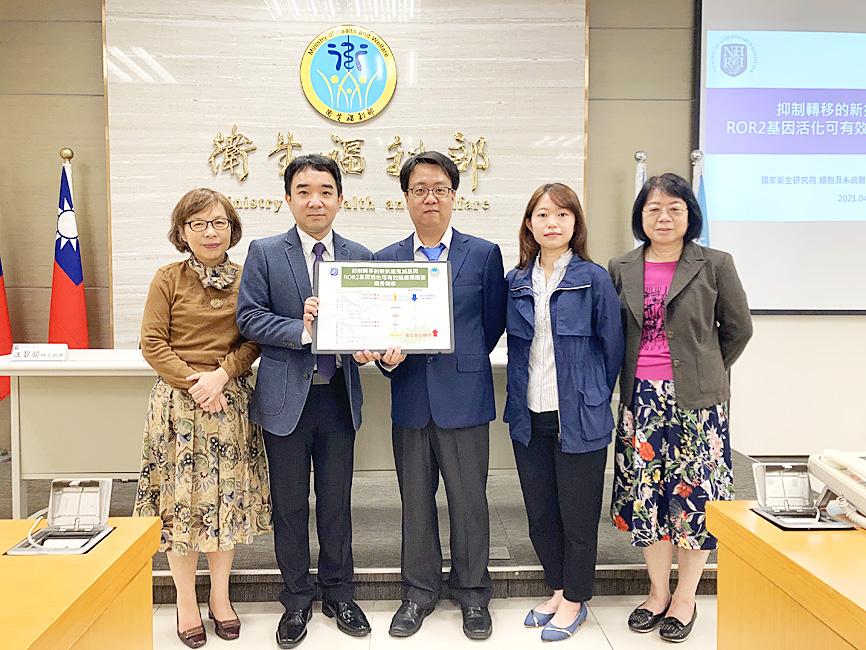National Health Research Institutes (NHRI) researchers have found that stimulating activity of a certain gene might suppress the ability of prostate cancer to spread to the bones, a finding they said could lead to new medicines.
Chuu Chih-pin (褚志斌), an associate researcher at the NHRI’s Institute of Cellular and System Medicine, said in a statement on Friday that the team’s research focused on the role of the ROR2 gene, which is involved in the chemical signaling that regulates cellular activity.
Prostate cancer is the second-most common cancer among men globally and the sixth-most common cancer in Taiwan, Chuu said.

Photo: Wu Liang-yi, Taipei Times
Many cases are detected early, but for cancers that have already spread, the only treatment available is hormone therapy, which in 95 percent of cases fails to prevent a recurrence within one to three years, he said.
The NHRI team used in vitro and mouse-based experiments to study how prostate cancer spreads in bone marrow, which, along with the lymph nodes, is one of the most common sites of metastasis, Chuu said.
The team first observed that ROR2 levels were significantly lower in metastatic tumors compared with the primary tumor in the prostate or in normal prostate tissue, he said.
In a follow-up experiment, the team artificially elevated levels of ROR2, and discovered that this suppressed the migration and invasion of several types of cancer cells, Chuu said.
Although there are no medicines on the market to stimulate ROR2 expression, earlier research by the team found that caffeic acid phenethyl ester, a compound found in cinnamon and honey, might help to activate it, he said.
However, the amount of caffeic acid phenethyl ester that can be absorbed from these foods is relatively low, meaning that supplements in pill form would likely be a better option, Chuu said.
The team’s study was published in Cell Death & Disease, a peer-reviewed online journal.

A decision to describe a Chinese Ministry of Foreign Affairs statement on Singapore’s Taiwan policy as “erroneous” was made because the city-state has its own “one China policy” and has not followed Beijing’s “one China principle,” Deputy Minister of Foreign Affairs Tien Chung-kwang (田中光) said yesterday. It has been a longstanding practice for the People’s Republic of China (PRC) to speak on other countries’ behalf concerning Taiwan, Tien said. The latest example was a statement issued by the PRC after a meeting between Singaporean Prime Minister Lawrence Wong (黃循財) and Chinese President Xi Jinping (習近平) on the sidelines of the APEC summit

Taiwan’s passport ranked 34th in the world, with access to 141 visa-free destinations, according to the latest update to the Henley Passport Index released today. The index put together by Henley & Partners ranks 199 passports globally based on the number of destinations holders can access without a visa out of 227, and is updated monthly. The 141 visa-free destinations for Taiwanese passport holders are a slight decrease from last year, when holders had access to 145 destinations. Botswana and Columbia are among the countries that have recently ended visa-free status for Taiwanese after “bowing to pressure from the Chinese government,” the Ministry

HEALTHCARE: Following a 2022 Constitutional Court ruling, Taiwanese traveling overseas for six months would no longer be able to suspend their insurance Measures allowing people to suspend National Health Insurance (NHI) services if they plan to leave the country for six months would be abolished starting Dec. 23, NHIA Director-General Shih Chung-liang (石崇良) said yesterday. The decision followed the Constitutional Court’s ruling in 2022 that the regulation was unconstitutional and that it would invalidate the regulation automatically unless the NHIA amended it to conform with the Constitution. The agency would amend the regulations to remove the articles and sections that allow the suspension of NHI services, and also introduce provisional clauses for those who suspended their NHI services before Dec. 23, Shih said. According to

Minister of Labor Ho Pei-shan (何佩珊) yesterday apologized after the suicide of a civil servant earlier this month and announced that a supervisor accused of workplace bullying would be demoted. On Nov. 4, a 39-year-old information analyst at the Workforce Development Agency’s (WDA) northern branch, which covers greater Taipei and Keelung, as well as Yilan, Lienchiang and Kinmen counties, was found dead in their office. WDA northern branch director Hsieh Yi-jung (謝宜容), who has been accused of involvement in workplace bullying, would be demoted to a nonsupervisory position, Ho told a news conference in Taipei. WDA Director-General Tsai Meng-liang (蔡孟良) said he would